In the two years since Magen Hanegev (Negev Shield) began, the successes of the multi-armed security operation have seen the confiscation of hundreds of illegal weapons and tons of drugs before they flooded Israeli streets.
On an almost weekly basis, IDF troops along with Israel Police officers have thwarted attempts by criminals, who try to smuggle in drugs or weapons along Israel’s borders. Most recently, soldiers seized some 33 kilograms of hashish estimated to be worth NIS 600,000 (around $177,000) near the border with Egypt’s Sinai Peninsula.
The giant bust is just one of several large-scale attempts foiled by security as part of Magen Hanegev, an ongoing joint operation by the IDF, Israel Police and other security bodies. Hundreds of officers work day in, day out to stop an increase in the number of illegal weapons and drugs getting into the hands of criminal networks.
The operation also targets the countless marijuana greenhouses built in live-fire zones and cracks down on infiltrations into military bases in order to steal weapons.
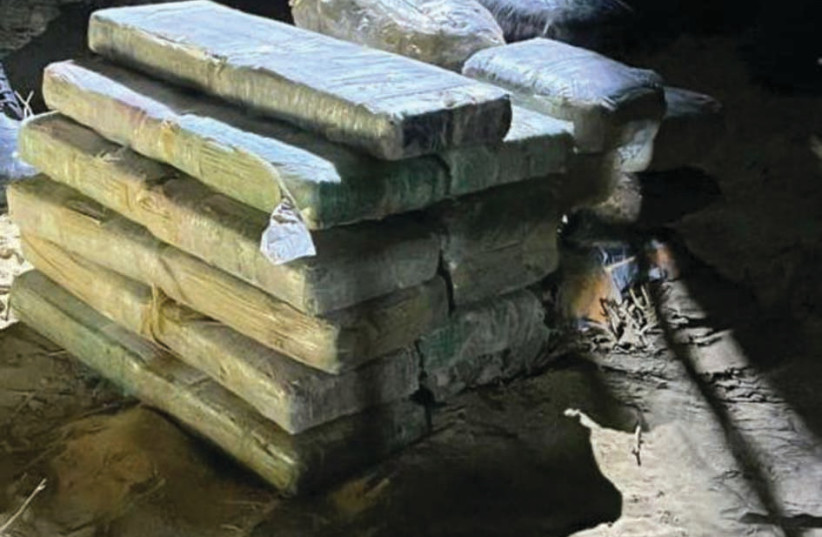
Crime runs rampant in the Negev
While crime, such as weapons and drug smuggling, has been rampant in the Negev for decades, the military and police have only recently begun to view it as a risk to national security. This is in part due to the surge in violence committed during smuggling attempts and weapons thefts from bases.
According to IDF figures, there has been a decrease by half in the total amount of drugs smuggled across the border and an increase of about 130% in the number of attempts intercepted, compared with last year.
And the total cost of the drugs smuggled into Israel has decreased from $4 billion (NIS 13.6 b.) in 2019 to $1.86 billion (NIS 6.3 b.) in 2020. Once Magen Hanegev began in full force, the number went down even further to $370 million (NIS 1.26 b.) in 2021 and $85 million (NIS 290 m.) in 2022.
In 2019, there were a total of 350 smuggling attempts identified, with 30 thwarted. The next year, out of a total of 280 smuggling attempts, the IDF thwarted some 60 and confiscated close to 400 large bags of drugs, 20 cars and arrested some 20 smugglers.
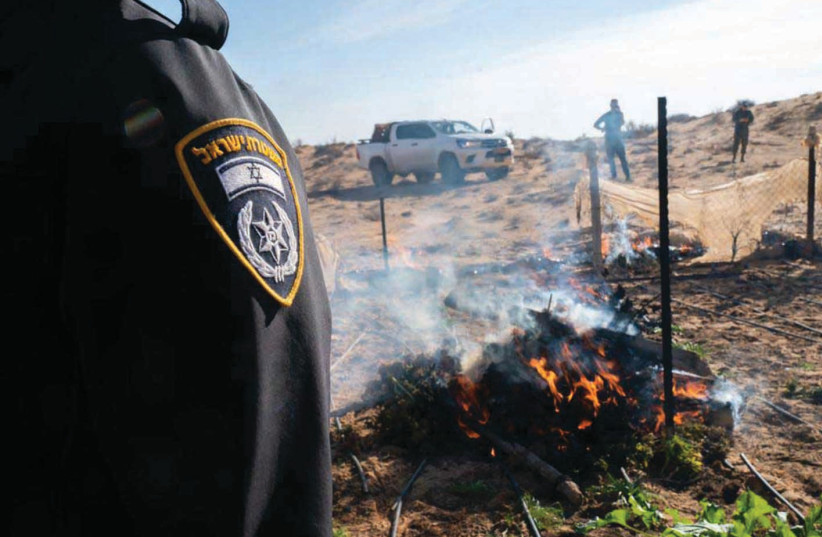
Last year, 175 smuggling attempts were intercepted and increased to 245 in 2022. A total of 65 attempts were foiled in 2021 compared to 35 in 2022. Nevertheless, there was a significant decrease in the number of successful smuggling attempts, from 215 in 2021 to 85 in 2022.
Regarding greenhouses, over the course of 2021-2022, more than 2,000 active greenhouses were destroyed by security services. In 2021 alone, over 1,200 active greenhouses were destroyed. Sources explained that many more inactive greenhouses and related equipment were also destroyed or seized by security forces.
WHAT IS smuggled into Israel differs along the borders
Along the Egyptian border, which used to see a lot of human trafficking in the past, it is the smuggling of drugs, such as marijuana and hashish. Along the Jordanian border, it is usually weaponry and harder drugs, such as cocaine and ecstasy.
Israel also serves as a transit country, due to its strategic location, with drugs being flown or shipped into the country from places such as South America and Europe.
In Israel, the most prominent drug is marijuana, due in part to its decriminalization in 2017, with drugs like heroin and cocaine becoming more popular.
According to the Global Organized Crime Index, Israel has become a large legal exporter of medical cannabis after hundreds of farms applied for licenses to grow medical marijuana. Nevertheless, thousands of illegal greenhouses have been discovered by the authorities in the Negev, who carry out weekly operations to destroy them.
A senior military official in the Southern Command told the Magazine that, although the military has worked with the police in the past, the way they have come together and worked over the past year in Magen Hanegev is much more intimate and allows them to be more precise, in terms of actionable intelligence.
The operation is run from a police headquarters in Beersheba, with IDF soldiers and officers sitting next to police officers. The headquarters, though small, works 24/7 and is full of screens where the officers can keep an eye on the borders.
The headquarters brings together the strengths of all security bodies in order to raise the operation to a new level. Sitting at the same table, forces are in constant contact with each other and with troops on the frontlines, whether along the borders or among the civilian population in city centers.
According to the officer in charge of the headquarters, forces initially worked separately, with IDF forces based at the Paran Headquarters at Ketziot in an area that has been marked as vulnerable to threats like drug smuggling due to the settlements in the region while the police were in Beersheba.
The move to a shared headquarters, though odd at first, has allowed them to synchronize their work and lead operations to be far more effective than before.
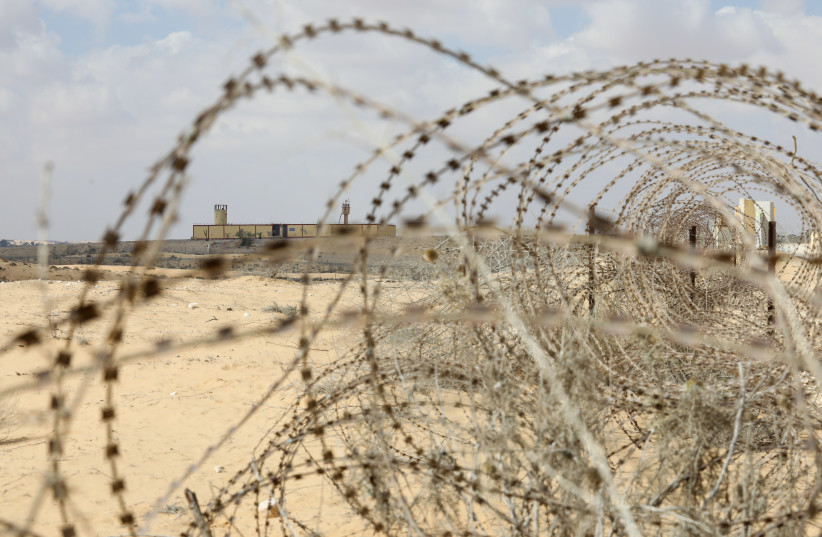
Smuggling from Egypt
OVER THE years, the 240-kilometer-long border between Israel and Egypt’s Sinai Peninsula has seen numerous terror attacks and countless smuggling attempts.
The eight-meter-tall barrier with Egypt stretches along the entire border, from the Gaza Strip to the Red Sea resort town of Eilat. It was completed in 2014, and has significantly reduced drug and weapons trafficking and infiltrations by illegal migrants and terrorists.
Cairo and Jerusalem have been reported by foreign press to have been closely cooperating in the Sinai Peninsula in the fight against smuggling, since Egyptian strongman President Abdel Fatah al-Sisi rose to power. Nevertheless, smugglers continue to attempt to get their products into Israel.
In the majority of smuggling attempts, groups of men drive up to the border fence on the Egyptian side of the border and place ladders on the 10-foot-high fence. They quickly climb up and throw over bags of drugs to Israeli Bedouin smugglers waiting on the other side.
While the IDF has been able to reduce the time it takes to arrive at such events to several minutes, the smugglers sometimes use drones and have military radios that alert them to troops that are on the way.
But the IDF and police use advanced intelligence-gathering means, as well as helicopters and off-road vehicles to catch those involved in smuggling attempts, from the man picking up the drugs that were thrown over the fence to the head of the smuggling ring.
The age of the smugglers differs, depending on their role in the network. Police officials explained to the Magazine that the head of the rings are usually between 30 to 40 years old, the ones picking up the drugs between 20 to 30 years old, and the Egyptians who bring the drugs to the border are usually teenagers.
According to the officers involved, most of the smuggling attempts happen in the middle of the night and there’s not one arrest that doesn’t end in violence or where the suspects disappear into the vast Negev desert before they are caught by the police.
While the Islamic State is not an imminent threat to Israel, drug and weapons smuggling by Bedouin from the Sinai Peninsula into Israel remain a major concern for IDF troops who are stationed along the southern border.
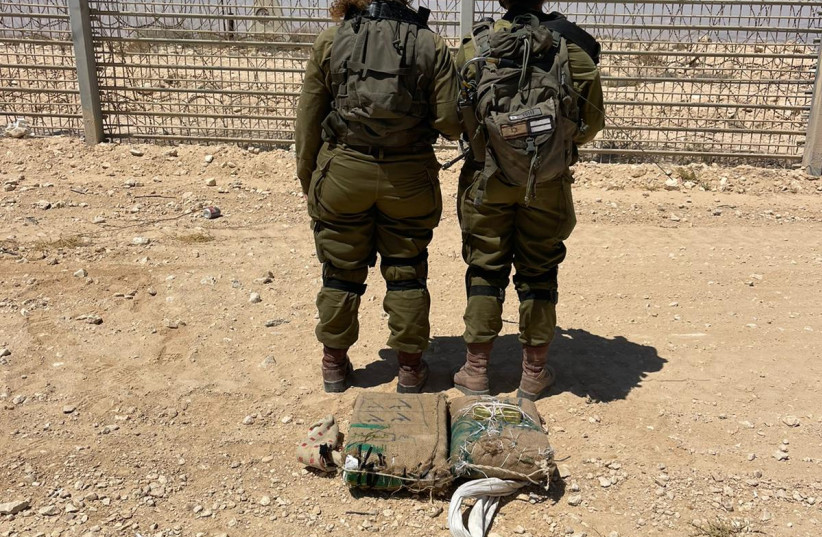
Smuggling from Jordan
THE COUNTRY’S eastern border with the Hashemite Kingdom of Jordan is also a mark for security forces.
Since the end of the Second Lebanon War in 2006, the border with Jordan has seen countless smuggling attempts. Drugs and weapons that originate from Iraq and Syria are smuggled into Israel and end up in the West Bank in the hands of potential Palestinian terrorists or criminal gangs inside Israel.
Though there is also a peace treaty with Jordan, the border is seen by authorities as having more challenging characteristics than the Egyptian border.
The border with Jordan only has a barrier that runs from Ramon International Airport to Eilat. The rest of the border, which is mostly in porous desert terrain and the Jordan Valley in the West Bank, has no such physical boundary to stop possible infiltrations.
Nevertheless, over the past six months, the IDF has integrated three new technological means, including reconnaissance balloons similar to those over the Gaza Strip to identify and monitor threats long before they arrive at the border.
As with the Egyptians, there is a shared interest in stopping the smuggling. Israeli security forces and their Jordanian counterparts share intelligence and carry out tactical cooperation to thwart infiltrations.
In January, the Jordanian Armed Forces announced that there has been a “dramatic” increase in drug smuggling attempts from Syria, having thwarted 361 infiltration and smuggling attempts. Security forces in the kingdom also seized over 15.5 million different kinds of narcotic pills and almost two kilograms of heroin.
In four large smuggling attempts in the area of the Yoav Regional Brigade (80th Division), 57 weapons worth NIS 7.5 million were confiscated. Another NIS 4 million of cocaine was intercepted, and 53 illegal migrants from Georgia, Sri Lanka, Moldova, Turkey and the United States were arrested after illegally crossing the border from Jordan.
In one event in March, security forces thwarted the smuggling of 37 weapons and ecstasy tablets worth NIS 2.3 million. The police said the weapons were set to be delivered to Palestinians in the Hebron area in the West Bank or to criminal elements in the South.
In another attempt in June, forces confiscated three bags containing five M16 rifles, seven pistols, a Kalashnikov rifle and ammunition.
A military official who took part in the operation in June told the Magazine that it was the largest smuggling attempt along the Jordanian border in years. There have been numerous smuggling attempts in the month since, but none as big as that attempt.
She explained that not having a barrier like the one along the Egyptian border gives the other side more breathing room to carry out their illegal activity. Nevertheless, with the border region full of sensors and intelligence-gathering capabilities, troops are able to speed to any spot along the border should they be alerted to suspicious movement.
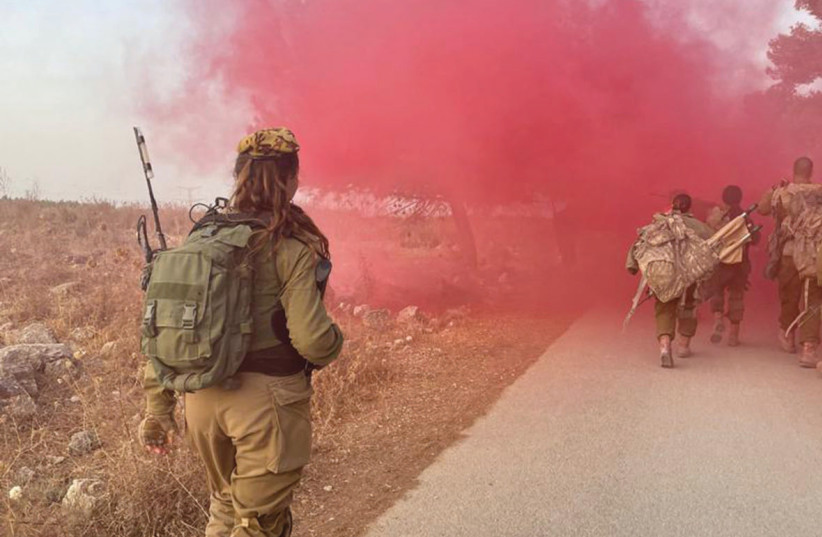
A central part of IDF missions
The Magen Hanegev operation is such a central part of the IDF’s missions that each day troops from the Bardelas Battalion hold daily assessments to go over new intelligence in order to decide where to focus their troop presence.
The co-ed Bardelas Battalion sees almost nightly activity along both borders. Unlike the border with Jordan, in some smuggling attempts along the Egyptian border, troops have been fired upon, leading them to fire back, sometimes killing the smugglers.
In one violent smuggling event, two border police officers were wounded in what was described as exceptionally violent.
According to the IDF, smugglers on the Egyptian side opened a massive barrage of gunfire toward IDF troops at around 1 a.m. The force returned fire and mistakenly identified a vehicle driven by undercover police as belonging to smugglers and fired toward the wheel of the car. As a result, the two officers were lightly injured in their hands from shrapnel.
It’s believed that the gunfire by the smugglers was to deter IDF troops and border police officers from approaching the area to thwart the smuggling.
The military said that a total of nine smuggling attempts were thwarted throughout the night and security forces seized approximately 400 kg. of drugs with an estimated value of NIS 8 million.
In a recent interview with the Magazine, Lieutenant Danielle Shalom, who serves in the battalion, said that some smugglers use rocket-propelled grenades, heavy machine guns and other weaponry against IDF troops.
“On a day-to-day-threat level, the Islamic State is less of a threat. It’s the criminal smugglers who are more worrisome. They fire on us and it’s a matter of life and death,” Shalom said. “At the end of the day, it’s not really any different than someone who crosses the border to carry out a terror attack.”
“On a day-to-day-threat level, the Islamic State is less of a threat. It’s the criminal smugglers who are more worrisome. They fire on us and it’s a matter of life and death.”
Lt. Danielle Shalom
A whole new Negev
WITH THE operation running for nearly two years, the military believes that they are in a whole new place compared to where they started.
“If you look at the last year and see if there have been any successes, the answer is clearly ‘Yes,’” said one senior officer in the Southern Command.
A police officer, involved in the operation since the beginning, explained that if the smugglers are not caught in the act, they know how to reach them in their communities, even where they feel safest: at home in bed.
Violent crime in the South, especially in the Bedouin community, has led to many complaints by local officials and residents. Last December, alternate prime minister Naftali Bennett said that the crime in Israel’s South should be a concern for the entire country.
“The crime in the Arab community is not only its problem, it is all of ours,” he said. “There are militias here like there were in the Wild West.”
But according to one officer who lives in Beersheba, thanks to Magen Hanegev, there has been a decrease in crime in the city and surrounding areas over the past year. Though the local Bedouin have been blamed for the rise in crime, the officer said that crime doesn’t have a ethnicity and that Jewish Israelis are also playing a role in the illegal activities.
According to the senior Southern Command officer, the residents of Israel’s South understand that Magen Hanegev is succeeding and that authorities will continue to crack down on crime.
He was backed up by Police Commissioner Kobi Shabtai, who earlier in the week said that the situation in the South was “better than ever, plain and simple.”
